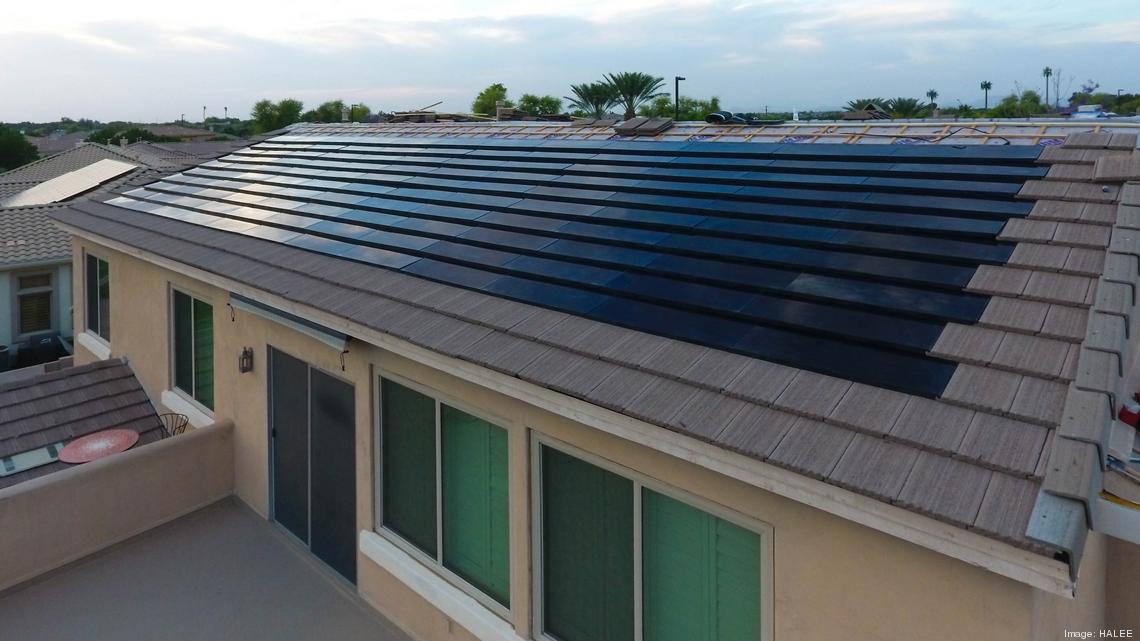Mesa-based startup Halee Solar is coming to a rooftop near you

Tyler Lyman first got the idea to install rooftop solar tiles years ago when he was building a home in Arizona. He thought traditional rack-mount arrays were ugly, so he decided to fabricate his own tiles, with little success.
“It didn’t work really at all, I wasn’t a very good engineer, I was much better on the software side than I was on the hardware side,” he said. “But it’s been something that I’ve had in the back of my mind for the last 16,17 years.”
He deferred his dream of building sleek rooftop tiles while he ran other companies in South Africa and China before returning to his native Arizona and starting Mesa-based Halee at the end of 2019.
Halee now has 13 employees (who have helped Lyman design and perfect the tiles) and the company is in the process of installing its building-integrated photovoltaics (BIPV) tiles on its first two homes in the Valley this week. Lyman said they plan on covering between 600 and 700 homes this year and up to 6,000 next year in Arizona, California, Texas, Florida, Mexico, Utah and Nevada.
Aside from designing an efficient and stylish solar tile, Lyman said Halee’s biggest competitive edge is its go to market strategy. Other solar companies target individual consumers who are interested in getting solar on their roofs, but Halee works with homebuilders and roofers to secure larger orders, drastically cutting sales and marketing costs.
Halee aims to reduce energy costs, carbon emissions
Halee is on the path toward becoming a complete clean energy tech provider, but it all starts with solar tiles. In the future the company plans to integrate its tiles with the rest of the home’s electrical systems so the systems function as one.
Next year the company plans to roll out a software that connects the Halee Solar tiles to the rest of the home to better deploy energy as it is gathered by the tiles. For example, Lyman said that if tiles are gathering excess energy the software will automatically deploy it in the home by doing things like turning on air conditioning or running pool water pumps.
The ultimate vision for Lyman is that Halee, through its tiles and software integration, will help reduce energy costs and ultimately reduce carbon emissions. He said that at this stage in his career it is important to work on something with a strong social impact, not just a profit motive.
Lyman has decades of experience building companies in other parts of the world, but once he moved back to Arizona full time he wanted to get more involved in the startup ecosystem, and last year he joined the StartupAZ Growth Cohort to do just that.
“I moved back to Arizona in 2017 with the goal of helping Arizona to continue to grow the entrepreneurial ecosystem, and hopefully build a company here,” he said. “[We] decided to put it through the cohort to become part of the community, so it’s been great.”
Thus far the company has mostly bootstrapped its operations, but Lyman said they are now in the process of rolling out a seed funding campaign.
The name Halee (pronounced Hal-e) was originally a working moniker, standing for home automation, lighting, environmental and electrical. Lyman said the temporary name stuck after the team made a connection to the movie ‘2001: A Space Odyssey.’
“It was supposed to be like Hal from Space Odyssey, but a kinder gentler version of an AI. That was kind of the internal joke, and then it just kind of stuck.”
